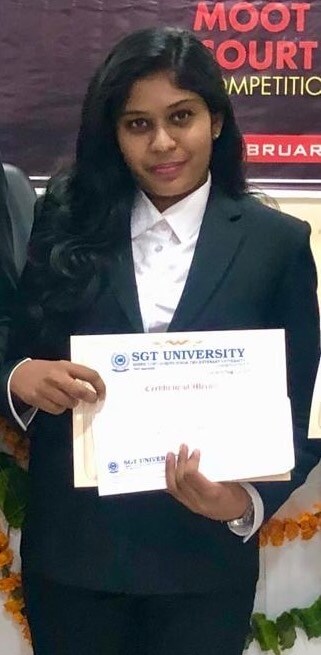(February 14, 2024) Ever pondered the legal procedures for transferring ownership of your property to another family person? Does an email agreement hold legal weight? What, after all, is a valid contract? Realising that there is a huge knowledge gap between the various civil and crime constitutional sections and the citizens, a 22-year-old law student decided to launch a website where one could look up any information about the law.

Founded on the principle of “simplifying complex Indian laws one concept at a time,” the Law Rewired initiative is the brainchild of Chennai-based Aswini Ramesh. “There was an increase in demand for details on family and property law, will or testament, and on court proceedings. And while researching about it, I realised that there were very few reliable resources available about the various sections of the Indian constitution online. Many people have to pay heavy amounts to get even a small work done, and I wanted to remedy the situation,” shared the Global Indian, who is also the recipient of the prestigious Diana Award, adding, “Law Rewired is an online student-run portal, that simplifies laws into easy to understand language for everyone. It is a unique portal offering qualitative information on law and related topics. The two important sustainable development goals – Quality Education and Gender Equality are among the indispensable objectives of this portal. The idea is to make people aware of their duties and remedies so that they do not suffer at a later point in time.”
View this post on Instagram
Law Rewired uses real-world analogies, concise bullet-pointed explanations, and a comprehensive glossary of legal terms to clarify the intricacies of laws. Additionally, they provide a range of legal translation categories encompassing property law to constitutional law. The group’s materials are freely accessible to everyone through their website and social media platforms such as Twitter, Facebook, Instagram, and LinkedIn. “For example, one of the laws that my company translated was India’s Information Technology Act. We explained terms used in the Act like “intermediary,” amendments added to it, why the law was enacted, and when the Act can be applied. After fleshing out those details, we summarised all the information in a section titled ‘In a Nutshell’,” shared the law student, who is also the global ambassador of the World Literacy Foundation.
Playing by the rules
Soon after she started pursuing a degree in law from the Dr. Ambedkar Law University School Of Excellence In Law, the youngster would often volunteer for various NGOs and had to travel to semi-urban and rural areas. It was here that she encountered people struggling to understand even the most basic laws. “Through my work as an activist, I’d often travel to workshops and other social initiatives at different institutions and be flooded with queries about day-to-day legal issues,” shared Aswini, adding, “This one time someone stopped me while I was at a gas station to ask what legal options their daughter had as a victim of domestic abuse. In another instance, a well-educated person who held a position of authority asked me about divorce alimony; another wanted information on a joint will since their grandfather was unwell; a friend’s brother, who was the family’s sole breadwinner, passed away in an accident and they had no idea about third party insurance claim.”
View this post on Instagram
Motivated to narrow the disparities between Indian law and the general public, she established Law Rewired in August 2020. Currently, the organisation is managed by 22 students hailing from 10 diverse law schools, along with an advisory board comprising esteemed legal scholars who willingly contribute their time to enhance the accessibility of Indian laws. To assemble this coalition, Aswini utilized social media to seek individuals interested in being ‘part of something meaningful’. “When I posted about the organisation for the first time, it immediately caught my attention. We got responses from all over the globe from places like Italy, Mauritius, California, and Madagascar to fill roles like content creator, website developer, and roles in public relations and marketing,” shared the law student.


Talking about the organisation’s current projects, she said, “Currently, they’re collaborating with the Child Awareness Project, which is helping us curate social media posts that involve law related to health, children, education, and women. Law Rewired is also in talks with three other organisations about potential collaborations. We are looking to do a special series on patients’ rights.”




